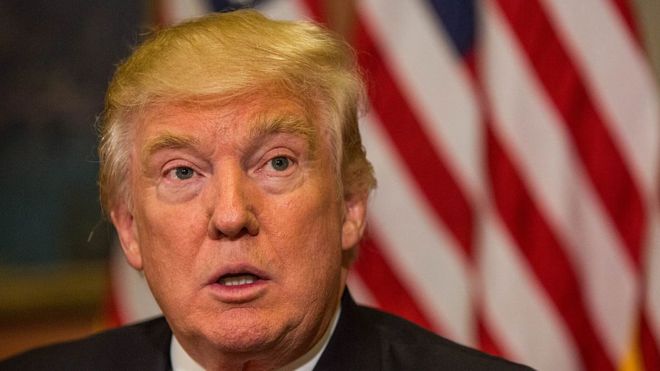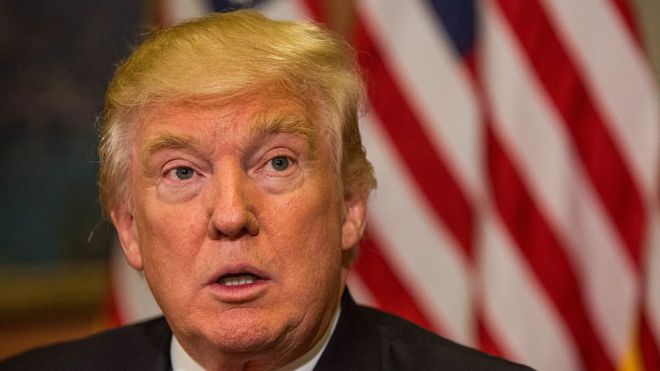Islamic State sees chance to revive fortunes in Trump presidency

US President Donald Trump.

IS has been weakened in recent months by battlefield defeats, the loss of territory in Iraq, Syria and Libya, and a decline in its finances and the size of its fighting forces.
Trump’s pledge to eradicate “Islamic extremism” looks at first sight to be yet another blow to Islamic State’s chances of success.
But Middle East experts and IS supporters say his election triumph could help revive the group’s fortunes. They also believe his move late last month to temporarily ban refugees and bar nationals from seven mainly Muslim countries could work in the group’s favor.
The executive order, on which IS has been silent, is in limbo after being overturned by a judge. But whether or not it is reinstated, it has angered Muslims across the world who, despite Trump’s denials, see it as evidence that he and his administration are Islamophobic.
The White House did not immediately respond to a request for comment on the accusations of Islamophobia. But White House spokesman Sean Spicer said last week: “The president’s number one goal has always been to focus on the safety of America, not the religion. He understands that it’s not a religious problem.”
Denying the travel ban would make the United States less safe, Spicer has said “some people have not read what exactly the order says and are reading it through misguided media reports.”
Yet such comments have not silenced the criticism.
“The ban on Muslim countries will undoubtedly undermine the global effort to discredit extremists,” said Hassan Hassan, a writer on Islamist radicalism and co-author of the 2015 book “ISIS: Inside the Army of Terror”.
The Organization of Islamic Cooperation (OIC), which comprises 57 member states, said such “selective and discriminatory acts will only serve to embolden the radical narratives of extremists.”
Jihadists are still celebrating Trump’s election triumph in online forums, saying it vindicates their argument that his views show the United States’ true face and that his policy will polarise communities, one of the militants’ goals.
“It is a blessing from Allah to the Muslims who lost their loyalty and faithfulness and preferred to choose the worldly life with all its luxuries that exists in the apostate land over the land of belief,” one jihadist wrote on the Islamist website al-Minbar.
DECLINING FORTUNES
IS has in recent months been significantly weakened on many fronts, with the caliphate it has created in parts of Iraq and Syria — where it has also imposed its ultra-hardline rule on residents — shrinking.
In Iraq, the group has lost territory in and around its northern stronghold of Mosul since U.S.-backed Iraqi forces last October began the biggest ground operation in the country since the 2003 U.S.-led invasion that toppled Saddam Hussein.
A growing number of disillusioned local Sunnis are now cooperating with the Iraqi army and helping in the fight against Islamic State and its financial resources have been badly hit. Turkey has also sealed its border, denying IS a route for bringing in foreign fighters and smuggling in other goods.
Islamic State’s presence in Iraq is mostly concentrated in the north, but it still has significant strongholds such as Tal Afar, to the west of Mosul, and nearby areas such as Al Qaem near the Syrian border. Even so, Prime Minister Haider al-Abadi has said IS will be driven out of the country by April.
IS still holds swathes of Syrian territory and is putting up fierce resistance in Raqqa, its capital in eastern Syria. It still holds around 90 percent of the province of Deir Ez-Zor near the Iraqi border, along with Raqqa and some parts of the eastern countryside of Aleppo in northern Syria. It also controls Palmyra and some pockets in Deraa in the south.
Its opponents in Syria include the Turkish army and Syrian rebel groups northeast of Aleppo. On several fronts it is fighting Syrian government forces supported by the Russian air force and Iranian-backed Shi’ite militia. Syrian President Bashar al-Assad has indicated he sees Trump’s views on Islamic State as promising.
In Libya, IS has lost control of the Mediterranean port city of Sirte to Libyan forces backed by U.S. air strikes. This defeat deprived the group of its main stronghold in North Africa, though it retains an active presence in other parts of Libya.
The number of IS fighters is now estimated by analysts and experts to be at 20,000 in Iraq and Syria compared with 36,000 in 2014. Since then, a large number of fighters and IS leaders have been killed in air strikes by the U.S.-led coalition and others have been captured by the Iraqi army or fled the country.
STRIKING BACK
Despite the setbacks, Islamic States is putting up fierce resistance and remains a deadly threat to the United States and its Western allies.
IS has started developing lethal alternatives to its caliphate, ranging from rural insurgencies in Syria and Iraq to carrying out attacks in Europe and targeting Western allies across the Middle East from Turkey to Egypt.
Now, some Islamist experts believe, IS may redouble its efforts to strike inside the United States, and replicate the fatal attacks carried out in the last 15 months in Paris, Brussels, Nice, Berlin and Istanbul.
Like al Qaeda before it, IS has long said the West has deep-seated hostility towards Muslims. Over the past decade, this narrative has been a factor in the steady growth of a radical audience in the Middle East and beyond.
Trump’s policies will make it a lot easier for the jihadists, says Mokhtar Awad, Research Fellow in the Program on Extremism at George Washington University.
“They will simply double down on the strategy (of attacks) and instead of investing totally in the battlefields they use, they will try even harder than they have already to activate cells in different Middle Eastern and Western countries,” Awad said.
“An attack in the U.S., as horrific as it may be, is the perfect thing that will work in their favor to show Trump is weak, and embolden the most exclusionary and xenophobic attitudes that some in this (U.S.) administration may have.”
BUILDING COMMUNAL DISTRUST
An important aim of IS strategy is to polarise societies and cause distrust of Muslim neighbours. Experts say IS believes that even if a Muslim does not join the group, he or she will be less inclined to oppose the militants if society is polarised.
Many analysts say the most urgent fight for Islamic State’s opponents is a political battle — how to make the group irrelevant to those who support it now.
Under Trump, who was inaugurated on Jan. 20, Washington has signalled it is looking for partners in the Middle East to take on IS.
In Iraq, U.S. forces, at the forefront of the Mosul campaign, are in practice aligned, though not allied, with Iran, whose influence with Baghdad’s Shi’ite-dominated government could increase if measures such as the U.S. entry ban go ahead or are reinstated.
In Syria, U.S. forces are relying on Syrian Kurdish fighters to encircle Raqqa. But this has upset NATO ally Turkey, which sees the Syrian Kurd militia as identical to Turkish Kurd insurgents it regards as terrorists. The United States and European Union list them as terrorist groups.
Trump’s overtures to President Vladimir Putin suggest Russia and the United States could become closer in the fight against IS, though many of their goals and allies are different.
This potentially budding relationship could also be an opportunity for IS. Analysts say it has already come to see Russia’s alliance with Shi’ite Iran as a recruiting tool because it has caused such anger among some Muslims.
